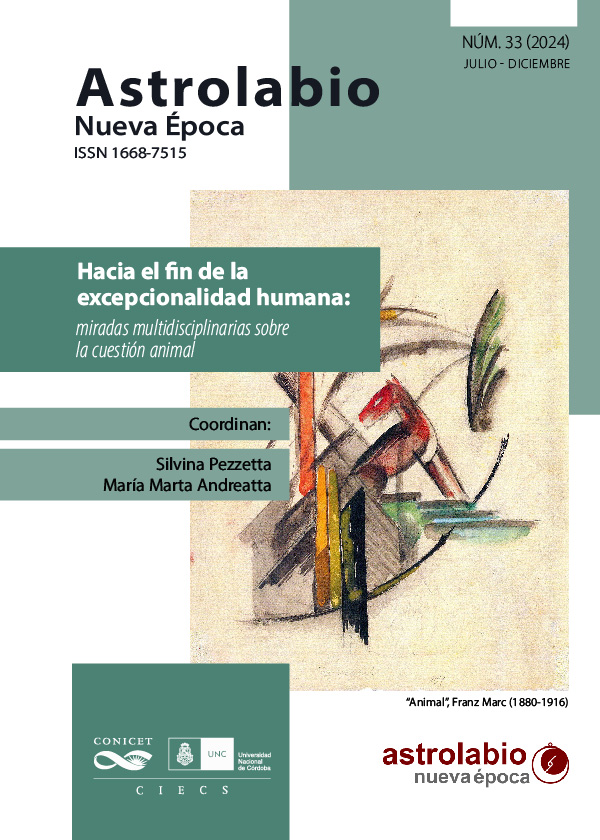Towards New Relationships Between Humans and Animals: A Sociological Approach to the Discourses and Meanings of Five Vegan Activists for Animal Liberation in the City of Iquique, Chile
Main Article Content
Abstract
The following research addresses the phenomena of veganism and activism for animal liberation, understanding both as forms of resistance and opposition to speciesism and the domination that humans exercise towards other animals. This work takes what is academically known as the “animal question” approach. In this regard, we sought to delve deeper into the discourses and meanings that emanate from the daily experience of vegan activists, and from their experiences as activists for animal liberation. Regarding the methodological aspect, the exploratory nature of the research and its phenomenological-interpretive design should be mentioned. The sample corresponds to five vegan activist subjects aspiring to animal liberation and residing in the City of Iquique, Chile. Data collection was carried out through semi-structured interviews, while the analysis was done through grounded theory. The main conclusion of the research was that the discourses and meanings of vegan activists are heterogeneous. However, and despite this, some common discourses and meanings can be found, for example, about the impossibility of abandoning veganism or regarding veganism as an engine of animal liberation.
Downloads
Article Details

This work is licensed under a Creative Commons Attribution-NonCommercial-ShareAlike 4.0 International License.
Astrolabio, Nueva Época está protegida bajo licencia Licencia Creative Commons Atribución-NoComercial-CompartirIgual 4.0 Internacional. La propiedad intelectual de los artículos pertenece a los autores y los derechos de edición y publicación a la revista. Los artículos publicados podrán ser usados libremente para propósitos científicos y académicos, siempre y cuando se realice una correcta citación de los mismos. Cualquier persona física o jurídica que desee reimprimir parte o la totalidad de algún artículo, deberá obtener permiso escrito de los editores de Astrolabio Nueva Época, quien lo otorgará con el consentimiento del autor.
References
ABOGLIO, A. M. (2009). Veganismo. Práctica de justicia e igualdad. Buenos Aires: De Los Cuatro Vientos.
ACOSTA-HUERFIA, L. (2020). “Prácticas de socialización política en la confluencia juvenil surgiendo del sur de Ibagué”. Eleuthera, 22-1, 211-227.
ALEDO, A. y DOMÍNGUEZ, J. A. (2001). Sociología ambiental. Granada: Grupo Editorial Universitario.
ALVARADO, S. V.; OSPINA-ALVARADO, M. C.; y GARCÍA, C. M. (2012). “La subjetividad política y la socialización política, desde las márgenes de la psicología política”. Revista Latinoamericana de Ciencias Sociales, Niñez y Juventud, 10-1, 235-256.
ÁVILA, I. D. (2016). La cuestión animal(ista). Bogotá: Desde abajo.
ÁVILA, I. D. (2019). “Los animales ante la muerte del hombre: (tecno)biopoder y performances de la (des)domesticación”. Tabula Rasa, 31, 251-268.
DE LA CUESTA BENJUMEA, C. (2015). “La calidad de la investigación cualitativa: de evaluarla a lograrla”. Texto & Contexto: Enfermagem, 24-3, 883-890.
BONILLA-GARCÍA, M. Á. y LÓPEZ-SUÁREZ, A. D. (2016). “Ejemplificación del proceso metodológico de la teoría fundamentada”. Cinta de Moebio: Revista de Epistemología de Ciencias Sociales, 57, 305-315.
CANTARUTTI, F. (2019). “Fundamentos ético-políticos de los discursos de los movimientos animalistas de la Región de Valparaíso, Chile”. Revista Latinoamericana de Estudios Críticos Animales, 6-1, 310-342.
CONCEPCIÓN, A. A. (2018). “El proceso de socialización y cultura políticas: análisis y perspectivas teóricas”. Universidad de La Habana, 286, 183-192.
CROSS, L. (1951). “Veganism Defined”. Gentle World. Disponible en: https://gentleworld.org/veganism-defined-written-by-leslie-cross-1951/ [consulta: febrero de 2023].
DÍAZ, E. (2012). “Perfil del vegano/activista de liberación animal en España”. Revista Española de Investigaciones Sociológicas, 139, 175-188.
DÍAZ-BRAVO, L.; TORRUCO-GARCÍA, U.; MARTÍNEZ-HERNÁNDEZ, M.; y VARELA-RUIZ, M. (2013). “La entrevista, recurso flexible y dinámico”. Investigación en Educación Médica, 2-7, 162-167.
DORADO, D. (2010). “La consideración moral de los animales no humanos en los últimos cuarenta años: una bibliografía anotada”. Telos, Revista Iberoamericana de Estudios Utilitaristas, 17-1, 47-64.
FRANCIONE, G. (2007). “Algunas reflexiones acerca de la educación vegana”. Anima, 30 de setiembre. Disponible en: http://www.anima.org.ar/algunas-reflexiones-acerca-de-la-educacion-vegana/ [consulta: junio de 2023].
FRANCIONE, G., y CHARLTON, A. (2013). Come con conciencia. Exempla Press. (No especifica lugar de edición.)
FUSTER, D. (2019). “Investigación cualitativa: método fenomenológico hermenéutico”. Propósitos y Representaciones, 7-1, 201-229.
HENRÍQUEZ, G. y BARRIGA, O. (2003). “La presentación del objeto de estudio. Reflexiones desde la práctica docente”. Cinta de Moebio, Revista de Epistemología de Ciencias Sociales, 17, sin paginación.
HORTA, O. (2011). “La argumentación de Singer en Liberación animal: concepciones normativas, interés en vivir y agregacionismo”. Diánoia, LVI-67, 65-85.
INFANTE, F. (2022). “Veganismo: prejuicios e identidad”. Revista Latinoamericana de Estudios Críticos Animales, 9-1, 97-116.
LEYTON, F. (2010). “Literatura básica entorno al especismo y los derechos animales”. Revista de Bioética y Derecho, 19, 14-16.
MARTÍNEZ-SALGADO, C. (2012). “El muestreo en investigación cualitativa. Principios básicos y algunas controversias”. Ciência & Saúde Coletiva, 17, 613-619.
NEIRA, H. (2017). “La difícil distinción entre humanos y animales”. Revista de Filosofía, 73, 161-178.
PLAZA, D. (2020). “Libertad, igualdad y abolición: sentando las bases para un post-abolicionismo animal y un derecho animal libertario”. Revista Latinoamericana de Estudios Críticos Animales, 7-2, 86-120.
POMA, A. y GRAVANTE, T. (2016). “«Fallas del sistema»: análisis desde abajo del movimiento anarcopunk en México”. Revista Mexicana de Sociología, 78-8, 437-467.
PONCE LEÓN, J. J. (2020). “Estudios críticos animales y sociología: apuntes teóricos sobre el post/anti-humanismo”. Revista Latinoamericana de Estudios Críticos Animales, 7-1, 400-421.
RIECHMANN, J. (2005). Todos los animales somos hermanos. Madrid: Catarata.
RODRÍGUEZ CÁCERES, V. y CORAYL VILLALOBOS, N. (2024). “Apuntes conceptuales para una actualización de la sociología de la familia. El concepto de «familia multiespecie» como pieza fundamental”. Tabula Rasa, 49, 83-105.
SALAMANCA CASTRO, A. y MARTÍN-CRESPO BLANCO, C. (2007). “El muestreo en la investigación cualitativa”. Nure Investigación, 27, sin paginación.
TORRES, B. (2014). Por encima de su cadáver. La economía política de los derechos animales. Madrid: Ochodoscuatro.
VILLAMOR, A. (2021). “Análisis del daño de la muerte en los animales a través del debate entre abolicionismo y bienestarismo”. Revista Latinoamericana de Estudios Críticos Animales, 8-1, 215-233.

